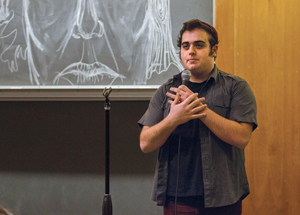Versed in the Truth

Kat Galvis Rodriguez ’17 and George Abraham ’17 (below) provide a preview of the performances they created for a national competition in Boulder, Colo. Photos by Martin Froger-Silva ’16.
“I was up until 4 last night. I’m just drained at this point. But it’s a good type of drained.”
While countless generations of Swarthmore students have spoken these words during rounds of misery poker in the midst of midterms and finals periods, Kat Galvis Rodriguez ’17 was describing something beyond the realm of academia: slam poetry.
Our Art Spoken in Soul (OASiS) began as a student group several years ago to develop and share slam poetry, a spoken-word art form in which artists recite original poetry, either individually or in groups of up to four people, dealing with a wide range of topics. Weekly meetings, which typically attract between five and 15 members, are times for students to write about anything they want, share with the group, and join in creative writing games to get creativity and words flowing. Members of the group, some of whom compete against other slam poetry teams around the nation, are quick to point out that “reciting poetry” does not begin to adequately describe what they do.
“Spoken word holds me accountable,” says Maria Vieytez ’16 a prospective English literature major from Commack, N.Y., who is one of the five members of the team that competes at the intercollegiate level. “Being on stage is a way of knowing that I have these things that I want to say. Having a supportive group of people sitting there for the sake of listening to you is such a beautiful opportunity to come to terms with the things you want to share with the world. Slam poetry is a time and place where you tell the truth.”
The topics that team members write about are almost always deeply personal. From family life to relationships to larger societal problems, nothing is off-limits. Given that such honest, emotional thoughts only arise in certain situations, students have come up with original ways to keep track of their ideas.
 “Some of us carry around journals, and whenever we see something that makes us mad, makes us laugh, or makes us happy, we just write it down,” explains Rodriguez, a prospective sociology and anthropology and political science major from Elizabeth, N.J. “You just write down a line or a few catchy words that will remind you of that [moment], and when you look back at it [the note], it triggers something in you.”
“Some of us carry around journals, and whenever we see something that makes us mad, makes us laugh, or makes us happy, we just write it down,” explains Rodriguez, a prospective sociology and anthropology and political science major from Elizabeth, N.J. “You just write down a line or a few catchy words that will remind you of that [moment], and when you look back at it [the note], it triggers something in you.”
While the group delights Swarthmore audiences, it also has enjoyed success at the national level. Last year, OASiS placed in the top 10 out of 59 teams at the College Unions Poetry Slam Invitational (CUPSI) in New York. Competition aside, bonding with spoken-word artists from around the nation is a benefit of the gathering of poets.
“I’m getting chills thinking about CUPSI,” says Rose Wunrow ’16, a prospective honors English literature major, honors history minor, and French minor from Montpellier, Vt., who traveled to the 2013 competition. “We stayed in a hostel, and we met other teams. One night a group of people sat with arms around each other reading poems that they didn’t get to read [on stage]. It was the warmest environment.”
This spring, the team of five—Rodriguez, Vieytez, Wunrow, George Abraham ’17, and Haydil Henriquez ’14—was gearing up for CUPSI in Boulder, Colo., March 12–15. (The team placed 26th out of 52.) While they have been successful competitively, the real benefits of slam poetry are more intangible.
“I think I’ve learned about empathy in a way I couldn’t have learned about it before this experience,” says Vieytez. “I’ve learned about trust both in my life and in a community sense. The experience makes a person feel completely illuminated and iridescent. That’s what makes poems. I’m a better person for being part of this group.”
 Email This Page
Email This Page